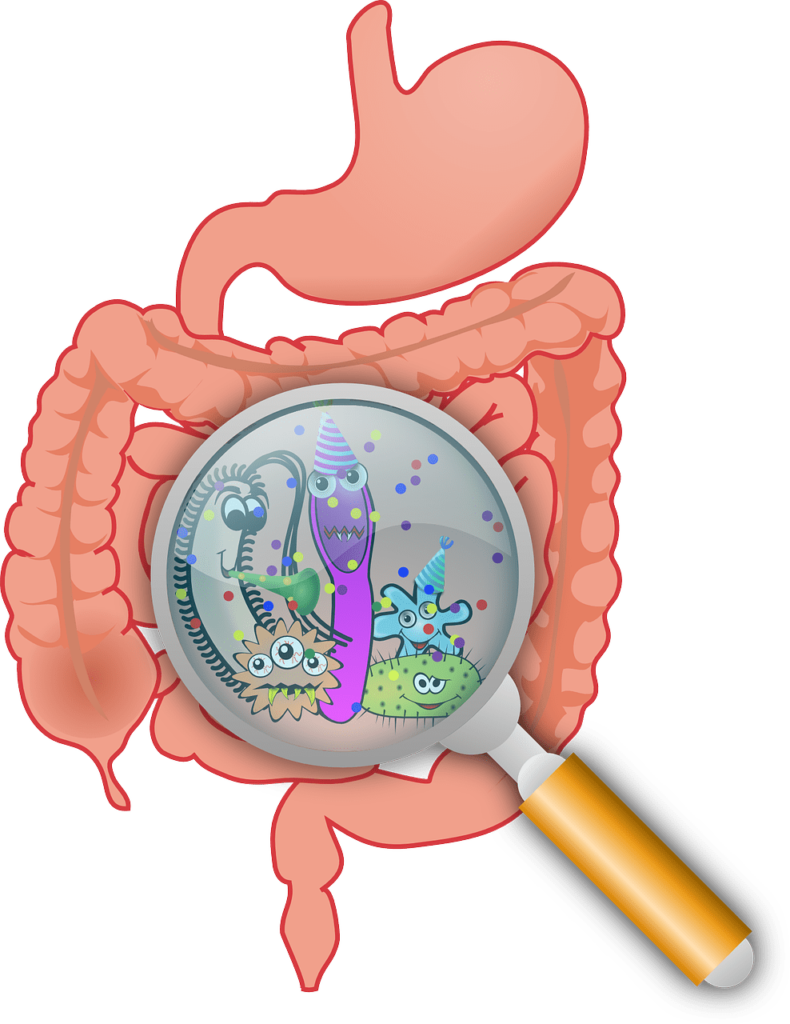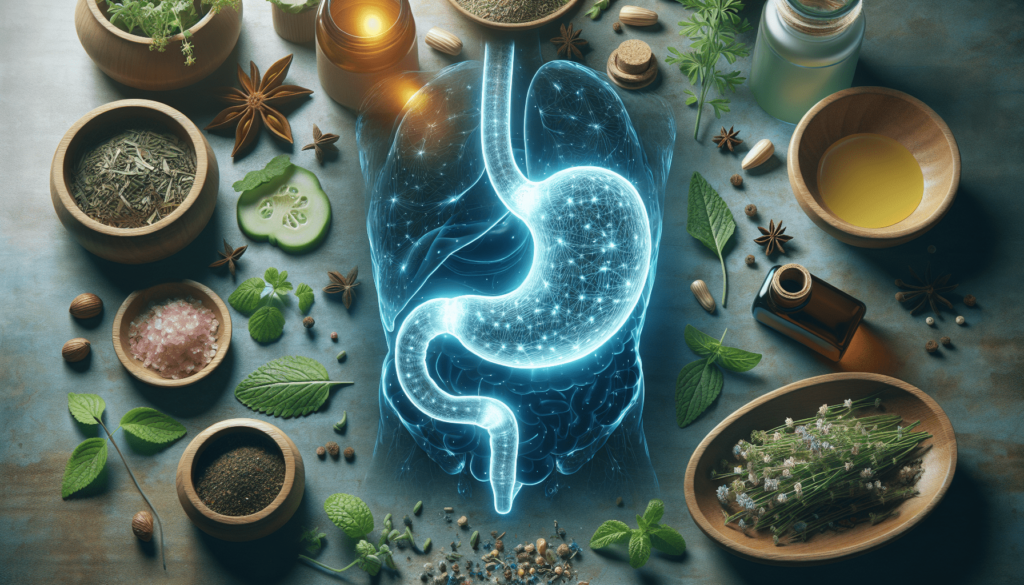Do you ever find yourself struggling with digestion issues? Whether it’s bloating, indigestion, or just feeling uncomfortable after a meal, we all want to find a natural solution to promote healthy digestion. Luckily, there are several herbs that have long been used to support and soothe the digestive system. From the calming properties of chamomile to the digestive powerhouse that is ginger, this article will explore the best herbs for enhancing your digestive health. So sit back, relax, and let’s discover the natural remedies that can help you achieve a happy and comfortable tummy.
Peppermint
Relieves digestive symptoms
Peppermint has long been hailed as a natural remedy for digestive issues. Its soothing properties can help alleviate symptoms such as bloating, indigestion, and stomach discomfort. By relaxing the muscles of the gastrointestinal tract, peppermint can promote smoother digestion and reduce the intensity of digestive symptoms.
Reduces gas and bloating
One of the most common complaints when it comes to digestion is the uncomfortable feeling of bloating and excessive gas. Peppermint is known for its ability to relieve these symptoms by relaxing the muscles in the intestines and allowing the gas to pass more easily. Adding a cup of peppermint tea to your routine can provide quick relief and help you feel more comfortable after a meal.
Soothes stomach discomfort
Whether it’s due to overeating, indigestion, or a sensitive stomach, stomach discomfort can be both physically and emotionally draining. Thankfully, peppermint can offer a natural solution. Its cooling and calming properties can help soothe the lining of the stomach and reduce feelings of pain or discomfort. So the next time you’re experiencing stomach troubles, reach for some peppermint tea or incorporate peppermint oil into your routine.
Ginger
Aids digestion
Ginger has been used for centuries as a natural remedy for digestive issues. It contains compounds called gingerols and shogaols, which promote the release of enzymes that aid digestion. These enzymes help break down food more efficiently, preventing common digestive problems such as indigestion and bloating. Adding ginger to your meals or enjoying a cup of ginger tea can give your digestion a much-needed boost.
Alleviates nausea and vomiting
Feeling nauseous or experiencing vomiting can greatly impact your overall well-being. Ginger has been found to be highly effective in reducing these symptoms, especially related to motion sickness, morning sickness during pregnancy, or undergoing chemotherapy. The active compounds in ginger work to relax the muscles in the digestive tract, preventing the urge to vomit and calming the stomach. Keep some ginger candies or ginger tea handy to help alleviate nausea when it strikes.
Reduces inflammation in the gut
Inflammation in the gut can lead to a host of digestive problems, including irritable bowel syndrome (IBS) and inflammatory bowel disease (IBD). Ginger’s anti-inflammatory properties can help calm inflammation in the stomach and intestines, reducing the severity of symptoms. Regular consumption of ginger can provide long-term relief and support a healthy gut.

This image is property of pixabay.com.
Fennel
Relieves indigestion
Fennel has a long history of being used to treat indigestion, and for a good reason. Its aromatic compounds help relax the muscles in the digestive tract, allowing food to move through more easily and reducing the occurrence of indigestion. Fennel seeds can be chewed directly after a meal or steeped in hot water to make a soothing tea that aids in digestion.
Reduces flatulence
Excessive flatulence can be embarrassing and uncomfortable. Fennel’s natural carminative properties can help alleviate this issue by relaxing the muscles in the gastrointestinal tract and allowing trapped gas to be released. Incorporating fennel into your meals or enjoying fennel tea can effectively reduce flatulence and make you feel more at ease.
Improves gut health
A healthy gut is crucial for overall digestion and well-being. Fennel contains prebiotic fibers that act as food for the healthy bacteria in the gut. By nourishing these beneficial bacteria, fennel promotes a balanced and thriving gut microbiome. Consuming fennel regularly can improve gut health, resulting in smoother digestion and reduced digestive discomfort.
Chamomile
Calms the stomach
Chamomile tea is a popular bedtime beverage known for its calming properties. But did you know that it can also benefit your digestion? Chamomile’s gentle and soothing effect on the stomach can help calm stomach spasms and reduce feelings of discomfort. If you find yourself dealing with an upset stomach, a cup of chamomile tea can provide quick relief.
Reduces acid reflux
Acid reflux, also known as heartburn, can be a painful and disruptive condition. Chamomile has been shown to help reduce the symptoms of acid reflux by neutralizing stomach acid and relieving inflammation in the esophagus. Sipping on chamomile tea after meals or when experiencing heartburn can help alleviate these symptoms and provide relief.
Relieves abdominal pain
Abdominal pain can have a range of causes, from indigestion to menstrual cramps. Chamomile’s anti-inflammatory properties can help reduce inflammation in the digestive tract, easing abdominal pain and discomfort. Additionally, chamomile’s calming properties can help relax the muscles in the intestines, promoting smoother digestion and reducing pain.

This image is property of pixabay.com.
Turmeric
Eases indigestion
Turmeric, a vibrant spice commonly used in curry, has been recognized for its digestive benefits. It stimulates the production of bile, which aids in the breakdown and digestion of fats. This can help alleviate symptoms of indigestion and promote smoother digestion. Adding turmeric to your meals or enjoying a turmeric latte can provide these beneficial effects.
Reduces inflammation in the digestive tract
Inflammation in the digestive tract can lead to various gastrointestinal disorders. Turmeric contains a compound called curcumin, which has powerful anti-inflammatory properties. Regular consumption of turmeric can help reduce inflammation, relieve symptoms, and support a healthier digestive system.
Soothes gastrointestinal ulcers
Gastrointestinal ulcers can cause intense pain and discomfort. Turmeric has been found to be effective in promoting the healing of these ulcers by reducing inflammation and inhibiting the growth of harmful bacteria. Incorporating turmeric into your diet can help soothe gastrointestinal ulcers and support the overall healing process.
Dandelion
Stimulates bile production
Bile plays a crucial role in the digestion and absorption of fats. Dandelion has been traditionally used as a liver tonic and digestive aid due to its ability to stimulate bile production. By increasing the production of bile, dandelion helps improve fat digestion and prevents common digestive problems associated with a high-fat diet.
Improves liver function
The liver plays a vital role in digestion by producing bile and detoxifying the body. Dandelion is known to support liver health and improve its function. It acts as a natural diuretic, helping to eliminate toxins from the body and promoting a healthy liver. This, in turn, can lead to improved digestion and overall well-being.
Aids digestion of fatty foods
Consuming fatty foods can sometimes lead to digestive discomfort, especially if the body is not producing enough bile. Dandelion’s ability to stimulate bile production makes it an excellent aid for the digestion of fatty foods. Adding dandelion leaves to salads or enjoying dandelion root tea can help support the digestion of these heavier meals.

This image is property of pixabay.com.
Cinnamon
Reduces bloating and gas
Bloating and gas can be uncomfortable and may interfere with daily activities. Cinnamon has carminative properties, meaning it helps to relieve gas and bloating by reducing the formation of excess gas in the digestive tract. Sprinkling cinnamon on your meals or enjoying a cup of cinnamon tea can aid in reducing these digestive issues.
Improves nutrient absorption
Proper nutrient absorption is essential for overall health and digestion. Cinnamon has been found to enhance the absorption of nutrients in the small intestine, allowing your body to make the most of the food you consume. By improving nutrient absorption, cinnamon supports optimal digestion and helps your body receive the vital nutrients it needs.
Stimulates digestive enzymes
Digestive enzymes play a crucial role in breaking down food and facilitating digestion. Cinnamon has been shown to stimulate the production of digestive enzymes, helping to improve overall digestion. The increased production of these enzymes can lead to more efficient breakdown of food, reducing the likelihood of digestive discomfort.
Licorice
Soothes the stomach lining
Licorice has long been used as a natural remedy for digestive issues due to its soothing properties. It helps protect the stomach lining by promoting the production of mucus and reducing inflammation. By soothing the stomach lining, licorice can help alleviate symptoms of heartburn, indigestion, and other digestive discomforts.
Relieves heartburn and indigestion
Heartburn and indigestion can be incredibly uncomfortable and disruptive to daily life. Licorice can provide relief by reducing acid production in the stomach and promoting a healthy balance of digestive fluids. Adding licorice root to your diet or enjoying licorice tea can help alleviate these symptoms and support better digestion.
Facilitates bowel movements
Maintaining regular bowel movements is essential for a healthy digestive system. Licorice acts as a mild laxative, promoting bowel movements and preventing constipation. It can help regulate bowel movements and make the process of elimination more comfortable. Including licorice in your diet can support a healthy digestive system and promote regularity.

Mint
Relieves indigestion and heartburn
Mint has long been praised for its ability to soothe indigestion and heartburn. Its natural menthol content provides a cooling effect that can alleviate discomfort in the stomach and esophagus. Mint tea or chewing on fresh mint leaves can provide quick relief when you’re experiencing these digestive issues.
Reduces stomach cramps
Stomach cramps can be debilitating and affect your overall well-being. Mint’s antispasmodic properties help relax the muscles in the digestive tract, reducing the occurrence and intensity of stomach cramps. Incorporating mint into your diet or enjoying a cup of mint tea can effectively relieve stomach cramps and make you feel more at ease.
Improves bile flow
Bile plays a crucial role in the digestion and absorption of fats. Mint has been found to improve the flow of bile, aiding in the breakdown and digestion of fats. By promoting adequate bile flow, mint supports optimal digestion and prevents digestive problems associated with high-fat meals.
Gentian
Stimulates appetite and digestion
Sometimes, a poor appetite or sluggish digestion can contribute to digestive issues. Gentian has long been used as a tonic to stimulate both appetite and digestion. Its bitter properties help activate the taste buds and trigger the production of digestive enzymes, supporting the breakdown of food and enhancing nutrient absorption.
Reduces bloating and flatulence
Excessive bloating and flatulence can cause discomfort and disrupt daily activities. Gentian’s carminative properties help reduce these symptoms by relaxing the muscles in the digestive tract and aiding in the expulsion of trapped gas. Taking gentian supplements or drinking gentian tea can help alleviate bloating and excessive flatulence.
Alleviates stomach discomfort
Stomach discomfort can have various underlying causes. Gentian’s ability to stimulate digestion, reduce inflammation, and promote the release of digestive enzymes can help alleviate stomach discomfort. It can provide relief from symptoms such as nausea, cramps, and general digestive discomfort, making you feel more at ease.
In conclusion, a healthy digestive system is vital for overall well-being, and incorporating these herbs into your routine can provide a natural and effective way to promote digestive health. From soothing stomach discomfort to reducing bloating and improving nutrient absorption, the diverse properties of peppermint, ginger, fennel, chamomile, turmeric, dandelion, cinnamon, licorice, mint, and gentian can offer a range of benefits for your digestion. Whether you choose to incorporate these herbs into your meals, enjoy them as teas or supplements, or use them topically, they can support a happy and balanced digestive system.


